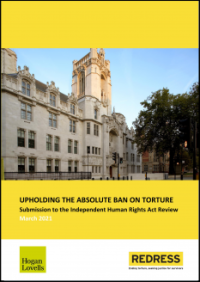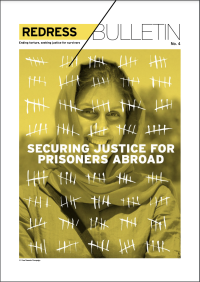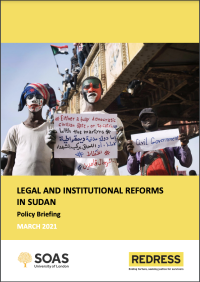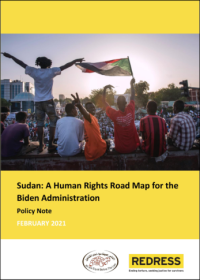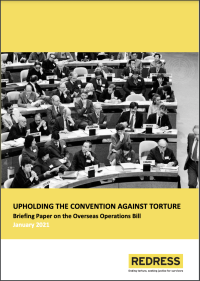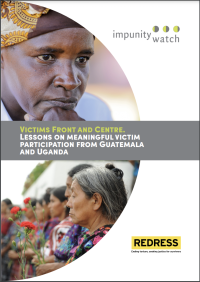Publications
REDRESS’ publications are also available in hard copy format. Please contact us for further information on [email protected].
This submission was made in response to the call for evidence of the Joint Committee on Human Rights (a select committee of both the House of Commons and House of Lords in the UK Parliament) in its inquiry regarding the UK government’s Independent Human Rights Act Review. This submission has been prepared jointly by REDRESS and Hogan Lovells International and draws from REDRESS and Hogan Lovells’ lengthier submission in response to the call for evidence of the Review, which is available in its entirety here.
This submission was prepared jointly by REDRESS and Hogan Lovells in response to the call for evidence of the Independent Human Rights Act Review published 13 January 2021. The principal aim of this submission is to share an understanding of how the Human Rights Act 1998 has, through its existing framework, effectively implemented the absolute prohibition of torture and inhuman or degrading treatment or punishment, as set out in Article 3 of the European Convention on Human Rights. However, the Article 3 prohibition cannot properly be understood in isolation from the other ECHR rights, or from other human rights obligations accepted by the UK. Accordingly, where responses to questions in the call for evidence require, a holistic view is offered.
In this Bulletin, we draw attention to the plight of British citizens detained abroad, such as Nazanin Zaghari-Ratcliffe and Jagtar Singh Johal. We also present our new five programmes - Justice, Reparation, Dissent, Discrimination and Solidarity - areas that align with our historical achievements and build on REDRESS’s established strengths. The Bulletin also provides the latest updates on our advocacy campaigns, publications and policy work during September 2020-February 2021, including an emerging area of work in which we have been engaging to respond to the connection between grand corruption and human rights abuses by taking action to seize the corrupt asset of high-profile human rights abusers and, where possible, have them assigned as reparations for the benefit of their victims.
The Juba Peace Agreement and the 2019 Constitutional Document commit Sudan’s transitional government to making a series of critical human rights reforms. A set of legislative amendments in November 2019 and July 2020 addressed key issues in Sudan, including female genital mutilation, cooperation with the International Criminal Court, and torture. While these reforms were widely welcomed outside of Sudan as a sign of the government’s commitment to addressing legislative shortcomings as part of Sudan’s political transition, more is needed.
This policy briefing suggests several priority areas for reform, including the review of security and judicial sector policies and practices, the criminalisation of torture and enforced disappearances in Sudan’s criminal code in conformity with UNCAT, and human rights training for government actors in key sectors, among others. These steps should be taken in collaboration with the whole spectrum of stakeholders including civil society, victims, communities, and marginalised groups in Sudan.
The new US president, Joe Biden, has signaled his commitment to resetting the US relationship with countries in Africa, including through a focus on fighting corruption and advancing human rights on the national and regional level. As part of this commitment to promoting democracy and enhancing protections for historically marginalised groups, the Biden administration should double down on a human rights-centred policy in Sudan. There is real momentum in Sudan for important reforms, but strong voices for change must contend with a deepening economic crisis and political headwinds. Recognising these challenges, the US should take concrete action to reinforce recent steps towards democratization and human rights reforms. This Briefing Note by REDRESS and PLACE lays out several human rights priorities for the United States in Sudan under the new administration.
This briefing note analyses the key elements of Sudan’s general amnesty, which was announced on 12 November 2020, and provides several points of clarification for the transitional government on the resolution’s scope of application.
The Overseas Operations Bill is being considered by the UK Parliament. The proposed legislation breaches international human rights law and international humanitarian law, as it creates a statutory presumption against the prosecution of international crimes including torture, crimes against humanity, and genocide. This Briefing Paper draws on REDRESS’ legal and practice expertise and sets out the ways in which the proposed Bill violates international law.
The report stems from extensive research and consultations that were carried out with victims of armed conflict in Guatemala and Uganda. Both countries have been the focus of international assistance for transitional justice for many years and, as such, they provide a long-term perspective on what has worked and what has not in terms of victim participation. This report is our attempt to recapitulate and explain what “victim-centred” should mean in the specific context of transitional justice. What is meaningful and can lead to change and what is merely ticking the box or promoting a mantra without providing the space for victims to shape their own future?

